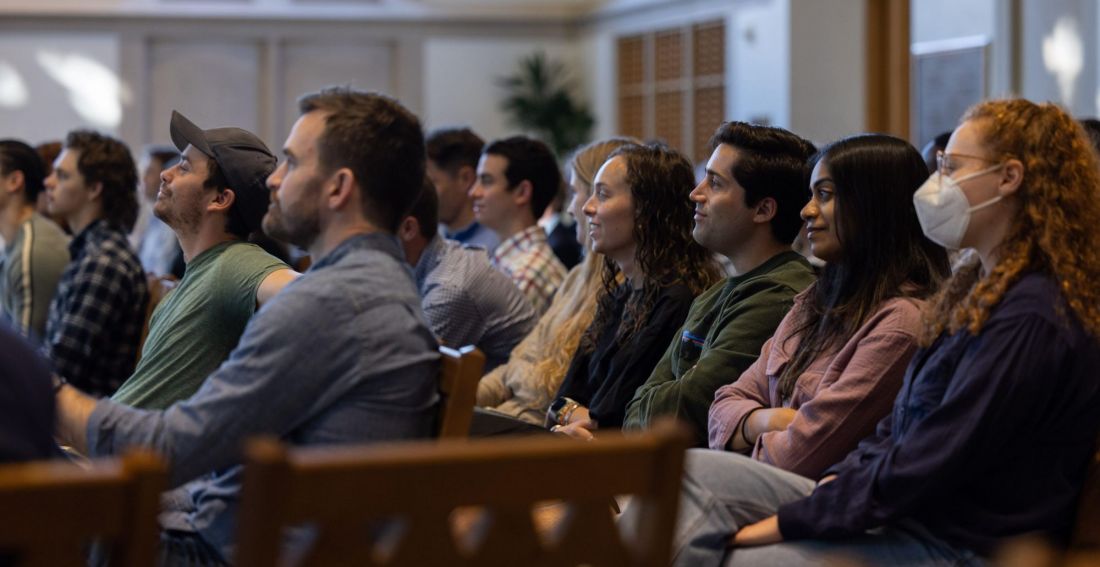The Residential Certificate in Theology and Health Care (CTHC) is a one-year course of study designed to equip health care practitioners with the training to engage their work with theological clarity and spiritual joy. The certificate blends foundational courses in Christian scripture, theology, and church history with specialized courses for those with vocations to health care. It aims to provide theological formation and enhance confidence for those seeking to engage questions of suffering, illness, and the work of healthcare in a faithful Christian life.
The full-time Residential CTHC is completed in-residence at Duke Divinity School. The Residential CTHC may be completed in conjunction with Duke School of Medicine for students enrolled in the M.D. or O.T.D. programs.
Theology, Medicine, and Culture Fellowship
Those seeking to complete the Residential CTHC are eligible to apply for the one-year track of the Theology, Medicine, and Culture (TMC) Fellowship, which offers successful applicants partial tuition support. Those who would benefit from the Residential CTHC include students taking a gap year before pursuing clinical training (e.g., medical school, nursing school, genetic counseling training), students in the midst of medical school or other clinical training, mid-career clinicians, public health professionals, and Christian nonprofit leaders.

"The Theology, Medicine, and Culture Initiative opened my eyes to both the profoundly difficult and complex within bioethics and theology as well as the beautiful and good within medicine, the church, and culture. Ultimately, I now see medicine as a place of wild and demanding hope where Christ, indeed, plays."
Curriculum
The course curriculum involves three primary components:
- Scripture, theology, and church history: Students can either take two core courses among disciplines, or take Cultivating Christian Imagination, a two-semester course that combines all three in a sweeping tour of Christian tradition and the practices of Christian communities.
- Health Care in Theological Context, a two-semester course on the intersection of theology and medicine, taught by core TMC faculty.
- Spiritual Formation and Community Engagement, a two-semester course that combines best practices of scripture reflection, Christian spiritual formation and disciplines, and mentoring, through which students discern what faithful practices look like in health care contexts. Students completing the Residential CTHC are eligible to take up to two additional courses of interest from other areas of the Divinity School.

Graduation Requirements
The Certificate is normally completed in one academic year. Requirements for graduation are:
- Six courses, typically completed in one academic year (maximum, three years).
- Consistent cumulative grade point average of at least 3.0
Students interested in pursuing a dual pathway—CTHC/MD or CTHC/OTD—should consult the paradigm for those programs for curricular requirements.
An education from Duke Divinity School is worth your investment, and you do not have to figure out the finances alone.
All residential C.T.H.C. students receive funding covering 25% of tuition costs. Duke Divinity School is investing in you, too. It is an investment in your education, the church, and our shared future.
Students in the Residential CTHC often participate in the Divinity School’s Fellowship in Theology, Medicine, and Culture program, which offers specific formational opportunities as well as supplementary scholarship support. Interested applicants should complete the fellowship application at the same time as their CTHC application.
Many other internal and external scholarships, as well as loans and federal financial aid for work-study, make it possible for students to afford Duke Divinity. FAFSA should be completed for need-based aid. More information can be found in our Financial Aid page.
Ready for the Next Step?
Duke Divinity School accepts applications beginning in September. The final deadline for applications is April 15. Admission requirements for the certificate include a demonstrated current vocation or intended vocation in health care and a minimum GPA of 3.00 in a bachelor’s degree from a regionally accredited college or university prior to the intended date of enrollment.
Request Info
Join our mailing list, and we'll send you more information.
Request Info about our programsVisit Campus
The best way to learn more about us is to visit. Schedule an in-person or online visit.
Visit Us
Learn More





